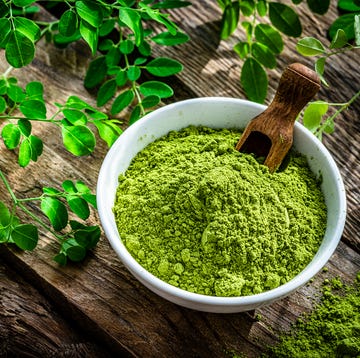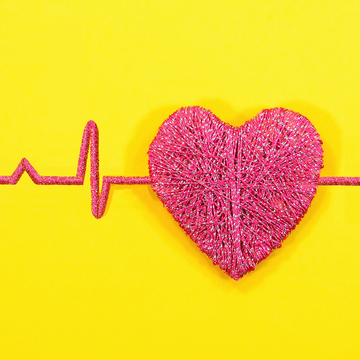1Hug it out.
 Rawpixel
Rawpixel Recent research has shown that physical touch—that means hugs, handshakes, and massage—can improve well-being and lessen pain, depression, and anxiety. It also lowers levels of the stress hormone cortisol. So give and receive hugs galore—they're good for you!
2Drink up, but make it cucumber water.
 Seva_blsv
Seva_blsvYour body needs fluids to maintain proper functioning, and you can amp up hydration and give your boring glass of H20 a refreshing hint of flavor by adding thinly sliced cucumbers. Not only is this veggie made up of 95% water and rich in electrolytes, it instantly transforms a glass of water into a spa-like treat.
Advertisement - Continue Reading Below
3Count your blessings (literally).
 Pikusisi-Studio
Pikusisi-StudioBeing grateful is good for you. Science shows that it can boost happiness and positive emotions, for starters, and people who acknowledge and express gratitude in their daily lives may also sleep better and have lower levels of depression and anxiety. A recent study found that writing down what you’re grateful for can help reduce stress. Gratitude journaling can work wonders.
RELATED: Best Gratitude Journals
4Phone (or text) a friend.
 Inside Creative House//Getty Images
Inside Creative House//Getty ImagesConnecting with a friend when you're feeling lonely or sad can work mood-lifting miracles. "Feeling connected to others is healthy for everyone," says Kissen. When it's just you (say, working alone all day, or simply feeling alone) your mind settles on what's not going right or what you have to get done.
"Your car payment and worries about work the next day take up so much of your field of vision," she says. "Connecting to someone or something beyond yourself, it doesn't feel like such a big thing. It is very healing." And if you're not feeling chatty or you find it stressful to reach out, attending a meditation class or working in a café puts you near other folks without all the pressure. "That way you put yourself around people but don't feel like you have to be 'on'" says Kissen.
Advertisement - Continue Reading Below
5Make something with your hands.
 blackCAT
blackCATStudies have shown that working with your hands and making some kind of art, whether it’s drawing, making pottery, crafting something, or creating or painting furniture can help reduce anxiety. Turns out that the process of being creative and making something decreases the stress hormone cortisol and promotes a feeling of calm. Plus, it’s just so satisfying!
6End your shower with an invigorating blast.
 Onzeg//Getty Images
Onzeg//Getty ImagesAfter you’ve scrubbed with warm water, switch to cold for 30 seconds. You’ll get a big burst of energy as your body tries to conserve heat and kicks your circulation into gear. Bonus: A 2007 study found that icy temps help release endorphins, which could have an antidepressant effect.
Advertisement - Continue Reading Below
7Do some yoga stretching.
 dima_sidelnikov//Getty Images
dima_sidelnikov//Getty ImagesStretching relaxes and loosens the body, of course, but there’s also evidence that it can ease your mind. One controlled trial showed that just 10 minutes of stretching in a slow and mindful way can help reduce anxiety. So, take a few minutes to do some downward-facing dog poses and sun salutations, stretch your back, your shoulders, arms and legs, breathe in and out deeply, and feel the de-stressing begin.
8Pamper your feet.
 Getty Images
Getty ImagesDoing a pedicure is so much more than just painting your nails. You'll also work to remove calluses and help make your feet feel baby soft.
Work to exfoliate the tough, dry skin on your feet by opting for a foot mask before you take care of cuticles and nails. Our beauty pros always reach for Aveeno's foot mask made with shea butter, making it easier to file away rough dead skin when you buff your feet afterward.
Advertisement - Continue Reading Below
9Make a DIY a humidifier.
 yocamon
yocamonA humidifier adds moisture to dry, heated indoor air in the wintertime and helps with health issues from dry skin and psoriasis to respiratory problems and even snoring. You can buy one, or simply make a humidifier by filling a heat-safe bowl with water (maybe add a few drops of essential oil for spa-like vibe) and placing it on top of a radiator or heating floor grate. When the heat cranks on, the evaporation begins and adds water vapor to the air.
RELATED: Best Humidifiers, According to Our Experts
10Pamper yourself.
 Jonathan Knowles//Getty Images
Jonathan Knowles//Getty Images Advertisement - Continue Reading Below
11Play your fav song.
 Eugenio Marongiu
Eugenio MarongiuEnergizing music can make you feel more alert and focused. The bottom line: Listening to something you love can help distract your brain from whatever you are anxious about and just make you happy.
12Cultivate a positive attitude.
 LaylaBird
LaylaBirdResearch shows that people who have a hopeful viewpoint tend to have healthier mental and physical health and can even live longer, happier lives. Multiple studies have found that positive thinking is associated with lower blood pressure and a lower risk of heart disease. Optimism is also linked to better diet and exercise habits. To cultivate a sunnier attitude, start by mindfully focusing on positive moments — it could be a delicious cup of coffee or a fun conversation with friends.
Advertisement - Continue Reading Below
13Lift weights while you watch TV.
Buy a set of light dumbbells (3 to 8 lbs), and while you watch TV, do moves like bicep curls and lunges. (Weight training improves bone density, muscle mass, and balance - plus it gives you something to do during commercials on your fav streamer.)
If you don’t have weights in your home, drop into a plank and hold it. Start by setting yourself up as if you’re going to do a push-up: Plant your shoulders over your hands, engage your core and your glutes as you keep your body in a straight line and hold for as long as you can.
14Don't check your phone right when you wake up.
 Natalia Lebedinskaia
Natalia LebedinskaiaResist the urge to look at your device first thing when you wake up. Instead, take time to set your intentions for the day.
If you use your phone for a morning wake-up, it can be almost impossible not to check the news or weather after hitting Snooze. Get an old-school low-tech alarm clock so you can leave your cell in another room or a bedside drawer while you sleep.
Advertisement - Continue Reading Below
15Take a lunchtime stroll.
 Westend61//Getty Images
Westend61//Getty ImagesResearch shows that 15 minutes of walking can potentially boost concentration and energy throughout the workday. It’s also a long-term boon: In a recent study, older adults with mild cognitive impairment who completed a regimen of moderate-intensity treadmill walking performed significantly better on cognitive tests than before they started working out. MRI scans suggest that exercise may regulate blood flow to the portions of the brain that are associated with memory, cognition and language/speech processing.
16Embrace JOMO (the joy of missing out).
 Daniel de la Hoz
Daniel de la HozAlways agreeing to post-work cocktails or dinners can leave you (and your finances) stretched thin. Once in a while, it's so empowering to simply cancel something!
Especially if you tend to over-schedule your time, take a look at your calendar and find one thing you can truly skip, like a social event you’re not psyched about or a Zoom meeting that doesn’t need your input. Bow out politely and replace it with…nothing. “Your body needs rest, and giving yourself permission to do nothing recharges your battery,” says Asha Tarry, L.M.S.W.
Advertisement - Continue Reading Below
17Exercise your feet.
 eternalcreative
eternalcreativeNo one is happy when their feet hurt. Loosen yours up by doing these two stretches as soon as you wake up, suggests New York City podiatrist and foot surgeon Brad Schaeffer, D.P.M., star of My Feet Are Killing Me on TLC. “Lie in bed and spell out the ABC’s with your feet to get the blood pumping,” he says. Next, lean against a wall and do four reps of a calf stretch, holding for 10 seconds each time to stretch from your plantar fascia all the way up to your Achilles tendon and calf.
18Take time to zone out.
 JGI/Jamie Grill
JGI/Jamie GrillNeed permission to just turn your brain off with a movie or series? Here it is. "Taking your attention and putting it on something else, versus thinking about all the things that are going on in your life is a nice pause," says Kissen.
No, you don't want to get sucked into episode after episode (being sedentary as a way of life is the opposite of self-care) but getting caught up in a narrative can give the busy brain a break. "Those things will still be there, but you'll have a reboot, so when you go back to them, you'll have a different perspective."
Advertisement - Continue Reading Below
19Stash the cookie jar.
 Image Source//Getty Images
Image Source//Getty ImagesAnd set out a giant fruit bowl instead — you’ll be more likely to reach for an apple or a banana. There really is something to the old adage “Out of sight, out of mind,” according to Dawn Jackson Blatner, R.D.N., author of The Superfood Swap. In your pantry, move healthy staples like quinoa, nuts, and canned beans to the front of shelves at eye level and put processed foods on a high shelf.
20Steep up your morning routine.
 Sarawut Doungwana / EyeEm//Getty Images
Sarawut Doungwana / EyeEm//Getty ImagesAdding tea to your a.m. can help support a healthy heart. Research shows that drinking green tea can help lower your blood sugar. Studies have also found that people with a habit of drinking black tea have a lower risk of developing heart disease. Tea is a major source of naturally occurring, heart-healthy flavonoids, and taking in a daily dose of at least 200 to 500 mg of these flavonoids can help keep your ticker ticking efficiently.
And contrary to what you may have heard, tea does not dehydrate you but rather counts toward your healthy water-consumption goals. Proper hydration is important to circulatory functions, so sip away and embrace the day.
Advertisement - Continue Reading Below
Readers Also Read
Advertisement - Continue Reading Below
Advertisement - Continue Reading Below
































